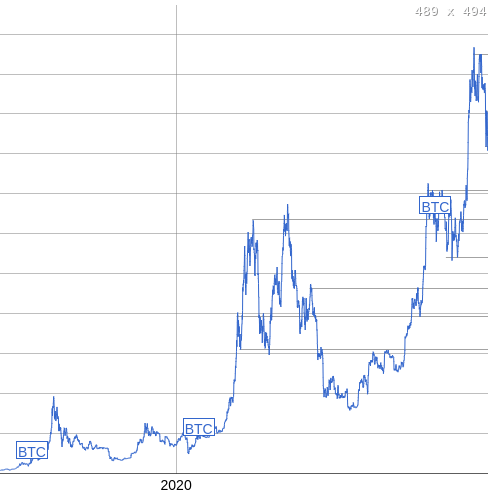Self custody
Self Custody For Me, But Not For Thee
Published
3 months agoon
By
admin


One counter-argument against pushing for greater scalability with Bitcoin is that “most people won’t self-custody anyway, so why bother?”
This is a wildly assumptive, arrogant, and outright fallacious argument. It is the same type of logical fallacy that human beings can’t help but make. The current state of the present is an indicator of what the state of the future will be.
“It’s not raining today, so it won’t be raining tomorrow.” It’s exactly the type of thinking that led Bitcoiners during the last market cycle to take for granted we would hit 100-200 thousand dollars as a peak then. That assumption was brutally destroyed by a double top at 69 thousand, a mere ~3.5x from the previous all time high.
The very nature of the digital age we live in, and the numerous radical transformations we have all seen within short periods of time during our lives alone should shake people out of their assumptions that the present is a demonstration of the nature of the future, but for many people it doesn’t.
First off, many people not currently self custodying their own coins do not even understand the distinction between self custody and their coins sitting on Coinbase. To many unsophisticated users, they’re all just apps that hold their bitcoin. I have encountered this misconception more times than I can count in my time in this space interacting with newer users. These users haven’t even been made aware of the possibility yet, discounting them is just absurd and presumptuous.
Secondly, users who choose to not self custody right now generally don’t because of the fear of losing their keys. It’s not a fear of “responsibility.” It’s a fear of them not being capable of properly handling redundancy in their key management, and losing everything they have invested due to incompetence or legitimate mistakes or freak accidents.
This isn’t 2013 anymore. People aren’t making backups of individual private keys in a digital file anymore. Key management schemes have come a long way since then. Mnemonic seeds, multisignature wallets, etc. Basic vaults using pre-signed transactions even exist, although are not widely used. Tools exist to make self custody available in ways that offer safeguards and helping hands in the case of mistakes and the need to recover coins keys have been lost to.
Unchained exists. Casa exists. Nunchuck exists. Bitkey exists. All of these tools will become even better as time goes on. Embracing Schnorr and Taproot, these recovery friendly self custody schemes can blind third party servers so that during signing and normal use these services don’t even learn anything about the coins users hold or transactions they co-sign. Taproot enables wallets to delegate emergency recovery keys to friends or family members without them knowing anything about those coins unless they are needed.
Tooling around self custody is advancing, and people’s attitudes around self custody will change alongside those massive advancements in technology. Discounting the need for scalability because people have reasons not to right now is pure arrogance.
It is nothing more than the “I have mine, so fuck everyone else” attitude. The current state of the world being a certain way does not guarantee it will be that way in the future. Only the arrogant assume so.
This article is a Take. Opinions expressed are entirely the author’s and do not necessarily reflect those of BTC Inc or Bitcoin Magazine.
Source link
You may like


‘Positive But Cautious’ Investors Pour Capital Into Ethereum, Solana, XRP and Sui: CoinShares


Bitcoin As The Global Denominator Of Capital


Trump’s Crypto Dealings Are Making Regulation ‘More Complicated’: House Financial Services Chair


Pontus-X taps Oasis for private, cross-border data sharing in E.U.


Elon Musk, Dogecoin Proponent and U.S. Agency Figurehead, Says ‘No DOGE in D.O.G.E.’


Crypto Investor’s Brave Yet Hilarious Prediction Speculates If XRP Price Will Hit $3,000 This Cycle
bill
Kentucky Senate Passes Bill Protecting Bitcoin Self-Custody Rights
Published
2 weeks agoon
March 14, 2025By
admin
Yesterday evening, the Kentucky Senate unanimously passed a bill aimed at protecting Bitcoin self-custody rights and digital asset mining operations. With a decisive 37-0 vote, the legislation, titled AN ACT relating to blockchain digital assets (HB 701), now moves to the Governor’s desk for final approval.
NEW:
Kentucky Senate passes bill that will protect Bitcoin self custody rights with 0 votes against it.
The bill now heads to the Governors desk. pic.twitter.com/HPciWIgpZO
— Bitcoin Magazine (@BitcoinMagazine) March 14, 2025
Sponsored by Representatives Adam Bowling and T.J. Roberts, the bill affirms the right of individuals to self-custody digital assets through self-hosted wallets. Additionally, it prevents local zoning laws from discriminating against digital asset mining businesses, ensuring that Bitcoin miners can operate freely within the state.
The bill outlines several key provisions, including:
- Protection for Bitcoin self-custody: Individuals have the legal right to use and store digital assets in self-hosted wallets.
- Prohibition of discriminatory zoning laws: Local governments cannot impose zoning changes that unfairly target digital asset mining businesses.
- Exemptions from money transmitter licensing: Home Bitcoin miners and digital asset mining businesses are exempt from Kentucky’s money transmitter requirements.
- Clarification of securities laws: Digital asset mining and staking as a service are explicitly not classified as securities under Kentucky law.
@Rawlings4Ky is carrying HB 701 which protects the use of digital assets and self-hosted wallets, prevents local zoning discrimination against digital asset mining businesses, and establishes guidelines for blockchain node operations. It shields node operators and staking… pic.twitter.com/1crnd8mqQS
— KY Senate Majority (@KYSenateGOP) March 13, 2025
After passing through the Kentucky House with a 91-0 vote on February 28, 2025, the bill moved swiftly through the Senate. The March 13 vote saw full bipartisan support, with 37 senators voting in favor, zero opposed, and one not voting.
The legislation now awaits the Governor’s signature, which would officially enshrine Bitcoin self-custody protections and digital asset mining rights into Kentucky law. If signed, Kentucky will become one of the more Bitcoin-friendly states in the country, setting a precedent for other states to follow.
Source link


People tend to celebrate periods of low feerates. It’s time to clean house, consolidate any UTXOs you need to, open or close any Lightning channels you’ve been waiting on, and inscribe some stupid 8-bit jpeg into the blockchain. They’re perceived as a positive time.
They are not. We have seen explosive price appreciation the last few months, finally hitting the 100k USD benchmark that everyone took for granted as preordained during the last market cycle. That’s not normal.


The picture on the left is the average feerate each day since 2017, the picture on the right is the average price each day since 2017. When the price was pumping, when it was highly volatile, historically we have seen feerates spike accordingly. Generally matching the growth and peaking when the price did. The people actually buying and selling transacted on-chain, people took custody of their own coins when they bought them.
This last leg up to over 100k does not seem at all to have had the same proportional affect on feerates that even moves earlier in this cycle have. Now, if you actually did look at both of those charts, I’m sure many people are going “What if this cycle is at the end?” It’s possible, but let’s say it’s not for a second.
What else could this be indicating? That the participants that are driving the market are changing. A group of people who used to be dominated by individuals who self custodied, who managed their counterparty risk by removing gains from exchanges, who generated time-sensitive on-chain activity, are transforming into a group of people simply passing around ETF shares that have no need of settling anything on-chain.
That is not a good thing. Bitcoin’s very nature is defined by the users who interact with the protocol directly. Those who have private keys to authorize transactions generating revenue for miners. Those who are sent funds, and verify transactions against consensus rules with software.
Both of those things being removed from the hands of users and placed behind the veil of custodians puts the very stability of Bitcoin’s nature at risk.
This is a serious existential issue that has to be solved. The entire stability of consensus around a specific set of rules is premised on the assumption that there are enough independent actors with separate interests that diverge, but align on a value gained from using that set of rules. The smaller the group of independent actors (and the larger the group of people “using” Bitcoin through those actors as intermediaries) the more practical it is for them to coordinate to fundamentally change them, and the more likely it is that their interests as a group will diverge in sync from the interests of the larger group of secondary users.
If things continue trending in that direction, Bitcoin very well could end up embodying nothing that those of us here today hope it can. This problem is both a technical one, in terms of scaling Bitcoin in a way that allows users to independently have control of their funds on-chain, even if only through worst-case recourse, but it is also a problem of incentive and risk management.
The system must not only scale, but it has to be able to provide ways to mitigate the risks of self custody to the degree that people are used to from the traditional financial world. Many of them actually need it.
This isn’t just a situation of “do the same thing I do because it’s the only correct way,” this is something that has implications for the foundational properties of Bitcoin itself in the long term.
This article is a Take. Opinions expressed are entirely the author’s and do not necessarily reflect those of BTC Inc or Bitcoin Magazine.
Source link
Bitcoin
Proton Wallet — Now Available To Everyone — Is A Great Starter Self-Custodial Bitcoin Wallet
Published
2 months agoon
February 10, 2025By
admin


In July of last year, Swiss privacy tech company Proton (makers of Proton Mail) announced it would be launching its own bitcoin wallet — Proton Wallet.
I (along with about 100,000 other users) was given early access to the wallet to test it out and was impressed with the wallet’s user interface. I particularly liked that it allows you to link a user’s email address to their bitcoin address so that you only need to input the email address when sending bitcoin.
You can read my review of the wallet here.
Now that the wallet is available to the general public, I will recommend it to anyone I know who’s finally ready to move their bitcoin out of the hands of an exchange and into their own custody. I’ll also recommend it to anyone looking to make semi-regular bitcoin payments on-chain with a relatively small amount of bitcoin.
My reasons for recommending the wallet are as follows:
- It’s free to use (users can create up to three wallets and have up to three accounts in each wallet, which is sufficient for most users — more on that here; to create more wallets or accounts, Proton charges a fee)
- It’s easy to set up (you aren’t required to write down the 12-word seed phrase when you set up the wallet; however, it’s good practice to do so!)
- Like Proton Mail, Proton has no access to Proton Wallet user data, nor does it have access to its users’ private bitcoin keys
- Using an email address (which doesn’t have to be a Proton Mail address) to send bitcoin reduces the likelihood of inputting the wrong bitcoin address into the recipient field of a transaction
- You can select the priority speed of a transaction when sending bitcoin
- You can purchase bitcoin via Ramp or Banxa using Proton Wallet, enabling the bitcoin you purchase to be transferred directly into your custody
The only downsides to the wallet is that it doesn’t support Lightning transactions (consider the Breez SDK, Proton team!), and it doesn’t let you manage your UTXOs (loose change from bitcoin transactions, in layperson’s terms).
The latter isn’t super important, though, as, again, I’d recommend this wallet to those new to bitcoin self custody. UTXO management is more of a practice for moderate to advanced Bitcoin users.
All in all, Proton has created yet another fine product here for its 100 million users and counting, and it’s one that I’ll be recommending to Bitcoin newbies moving forward.
This article is a Take. Opinions expressed are entirely the author’s and do not necessarily reflect those of BTC Inc or Bitcoin Magazine.
Source link

‘Positive But Cautious’ Investors Pour Capital Into Ethereum, Solana, XRP and Sui: CoinShares

Bitcoin As The Global Denominator Of Capital

Trump’s Crypto Dealings Are Making Regulation ‘More Complicated’: House Financial Services Chair

Pontus-X taps Oasis for private, cross-border data sharing in E.U.

Elon Musk, Dogecoin Proponent and U.S. Agency Figurehead, Says ‘No DOGE in D.O.G.E.’

Crypto Investor’s Brave Yet Hilarious Prediction Speculates If XRP Price Will Hit $3,000 This Cycle

Dogecoin (DOGE) Bulls In Trouble—Can They Prevent a Drop Below $0.15?

California introduces ’Bitcoin rights’ in amended digital assets bill

MELANIA Insider Hayden Davis Selling Millions of Dollars Worth of Memecoin Amid 95% Drop: On-Chain Data

Toulouse starts to accept crypto for public transport

Bitcoin, Crypto Prices Slide as Trade Tensions, Inflation Risks Rattle Markets

Will BlackRock Investors Stay Bullish?

Bitcoin Could Appear on 25% of S&P 500 Balance Sheets by 2030, Analyst Says

Centralization and the dark side of asset tokenization — MEXC exec

Bitcoin Support Thins Below $78,000 As Cost Basis Clusters Shift Toward $95,000

Arthur Hayes, Murad’s Prediction For Meme Coins, AI & DeFi Coins For 2025

Expert Sees Bitcoin Dipping To $50K While Bullish Signs Persist

Aptos Leverages Chainlink To Enhance Scalability and Data Access

Bitcoin Could Rally to $80,000 on the Eve of US Elections

Sonic Now ‘Golden Standard’ of Layer-2s After Scaling Transactions to 16,000+ per Second, Says Andre Cronje

Institutional Investors Go All In on Crypto as 57% Plan to Boost Allocations as Bull Run Heats Up, Sygnum Survey Reveals

Crypto’s Big Trump Gamble Is Risky

Ripple-SEC Case Ends, But These 3 Rivals Could Jump 500x

Has The Bitcoin Price Already Peaked?

A16z-backed Espresso announces mainnet launch of core product

Xmas Altcoin Rally Insights by BNM Agent I

Blockchain groups challenge new broker reporting rule

The Future of Bitcoin: Scaling, Institutional Adoption, and Strategic Reserves with Rich Rines

Trump’s Coin Is About As Revolutionary As OneCoin

Is $200,000 a Realistic Bitcoin Price Target for This Cycle?
Trending

 24/7 Cryptocurrency News5 months ago
24/7 Cryptocurrency News5 months agoArthur Hayes, Murad’s Prediction For Meme Coins, AI & DeFi Coins For 2025

 Bitcoin2 months ago
Bitcoin2 months agoExpert Sees Bitcoin Dipping To $50K While Bullish Signs Persist

 24/7 Cryptocurrency News3 months ago
24/7 Cryptocurrency News3 months agoAptos Leverages Chainlink To Enhance Scalability and Data Access

 Bitcoin5 months ago
Bitcoin5 months agoBitcoin Could Rally to $80,000 on the Eve of US Elections

 Altcoins2 months ago
Altcoins2 months agoSonic Now ‘Golden Standard’ of Layer-2s After Scaling Transactions to 16,000+ per Second, Says Andre Cronje

 Bitcoin5 months ago
Bitcoin5 months agoInstitutional Investors Go All In on Crypto as 57% Plan to Boost Allocations as Bull Run Heats Up, Sygnum Survey Reveals

 Opinion5 months ago
Opinion5 months agoCrypto’s Big Trump Gamble Is Risky

 Price analysis5 months ago
Price analysis5 months agoRipple-SEC Case Ends, But These 3 Rivals Could Jump 500x


